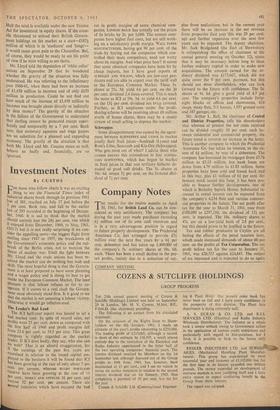Seven Per Cent on the Rates
By NICHOLAS DAVENPORT THE collision course on which Mr. Frank Cousins and Mr. Selwyn Lloyd are both set is going to be as exciting as any joust and much more dangerous for the bystanders. If our Frank emerges the winner, the Chan- cellor must obviously resign, the pound will be devalued and the market in Throgmorton Street will be open to every speculator running after inflation hedges. If our Selwyn wins, we can all look hopefully to a better- planned economy and an early relaxation of our monetary restraints. In particular, a lower Bank rate. The heavy inflow of short-term funds would not be welcome, says the Bank of England.
The sooner the collision comes the better, for this 7 per cent. Bank rate and credit squeeze are stifling business enterprise and ruining the poor local authorities. It was good to see the Sunday Express calling attention to this 'fantastic' 7 per cent. rate in its leading article, contrasting the New York 3 per cent., Montreal 2.8 per cent., Paris 31 per cent., Frankfurt 3 per cent., Amster- dam 3f per cent. and Zurich 2 per cent. Even India, in debt to the Western world for its new five-year plan, has a bank rate of only 4 per cent. Is it possible that Mr. Jacobsson of the IMF intends to hold us to 7 per cent. until we have repaid the IMF credits? This would be the most monstrous of all bankers' ramps.
If Mr. Lloyd insists on using monetary weapons in his fight against inflation he should see that innocent bystanders are not killed. I re- gard the local authorities as innocent bystanders, because the Government already has power to control their capital expenditures. But since 1955 the Government has forced them into the mone- tary firing line: it has insisted that they should borrow as far as possible in the open market in their own name and on their own credit. The Public Works Loans Board, which used to lend them money freely, is now the lender of last resort. The result has been appalling. As they have no hope of floating a loan in the present state of the capital market, they have been forced to borrow in the mortgage market, pledging their rateable income. And they have to pay at the moment up to 7/ per cent. on seven-day call money, 7 per cent. for six months, 7/ per cent. for a year, 71 per cent. for two to five years, 7/ per cent. for five to seven years and 7 per cent. for over seven years.
Mr. Lloyd protests that he is trying to stop the rise in the cost of living. But see how he raises the cost of local living! These fantastic loan charges have to fall on the rates. On the basis of last year's expenditure, of which 16 per cent. was met by borrowing, 7 per cent. loan charges would put £26 million on the rates and make the rent of a new (£3,000) council house £210 a year or £4 a week. (An extra 2 per cent. adds 24s. a week.) One begins to under- stand why Mr. Cousins insists that there can be no restraint for wages.
The proper course for any well-ordered and planned economy would be to devise a 'two-tier' system of interest rates. Social investment in houses, schools, hospitals, water and sewage should be financed at a specially low rate. The market rate should apply only to the business community whose activities the Chancellor is anxious to curb. Any curb on local-authority spending on capital account can be effected by direct order and by withholding the govern- ment grants. There would be no trouble in bringing a special low rate of interest into operation for social investment: it could be done simply through the PWLB and kept iso- lated from the market. Hitherto this has been objected to because it would be a veiled subsidy. But surely we ought to protect and subsidise social investment in this mad free-for-all eco- nomy? To pay a subsidy of near £40 million to prosperous farmers for their barley crop and refuse to 'subsidise' borrowing rates for pinched local councils does not make sense or justice.
It occurs to me that if the local councils fail to touch Mr. Selwyn Lloyd's heart in their plea for cheaper borrowing they might frighten him into action by threatening to upset his gilt-edged market. The Treasury has recently published the amounts of the local councils' superannuation and pension funds. For the UK the total is £563 million—a huge sum of which £219 mil- lion is held in British Government securities. Half the total is available under the new Trustee Act for investment in equity shares. If the coun- cils threatened to unload their British Govern- ment holdings on the market as a start—£1874 million of which is in 'mediums' and 'longs'— it would cause great pain to the Chancellor. But, of course, they would be ready to see his point of view if he were willing to see theirs.
Mr. Lloyd told the deputation of 'white collar' unions on September 29 that he wondered Whether the gravity of the situation was fully understood. He was referring to the inflationary Year 1960-61, when there had been an increase of £1,450 million in incomes and of only £650 million in production. Could he not find out how much of the increase of £1,450 million in incomes was brought about directly or indirectly by dear money? The gravity of the situation is the failure of the Government to understand that sterling cannot be protected except super- ficially and temporarily by a 7 per cent. Bank rate; that monetary squeezes and wage pauses are no substitute for a planned and expanding economy. The gravity of the situation is that both Mr. Lloyd and Mr. Cousins mean so well, behave so badly and, financially, are so ignorant.















































 Previous page
Previous page